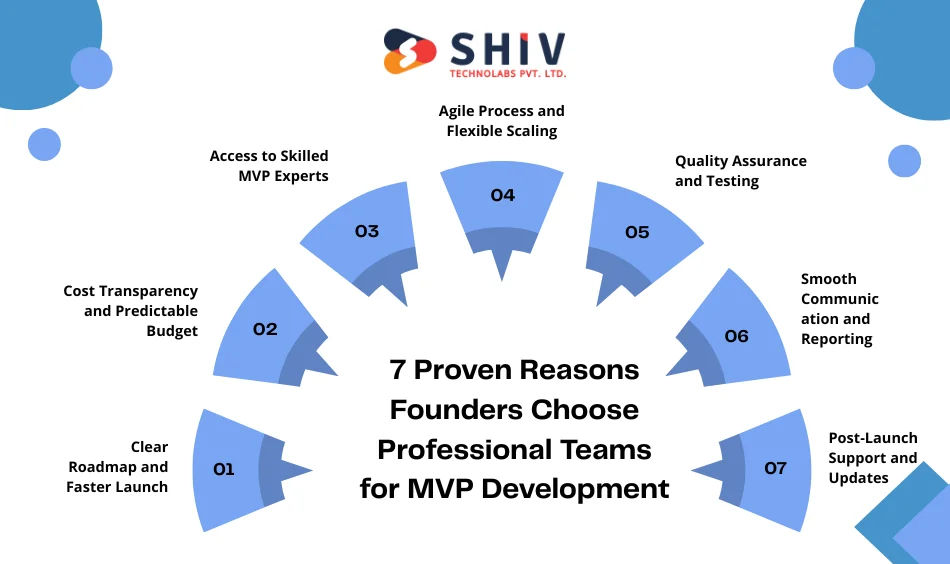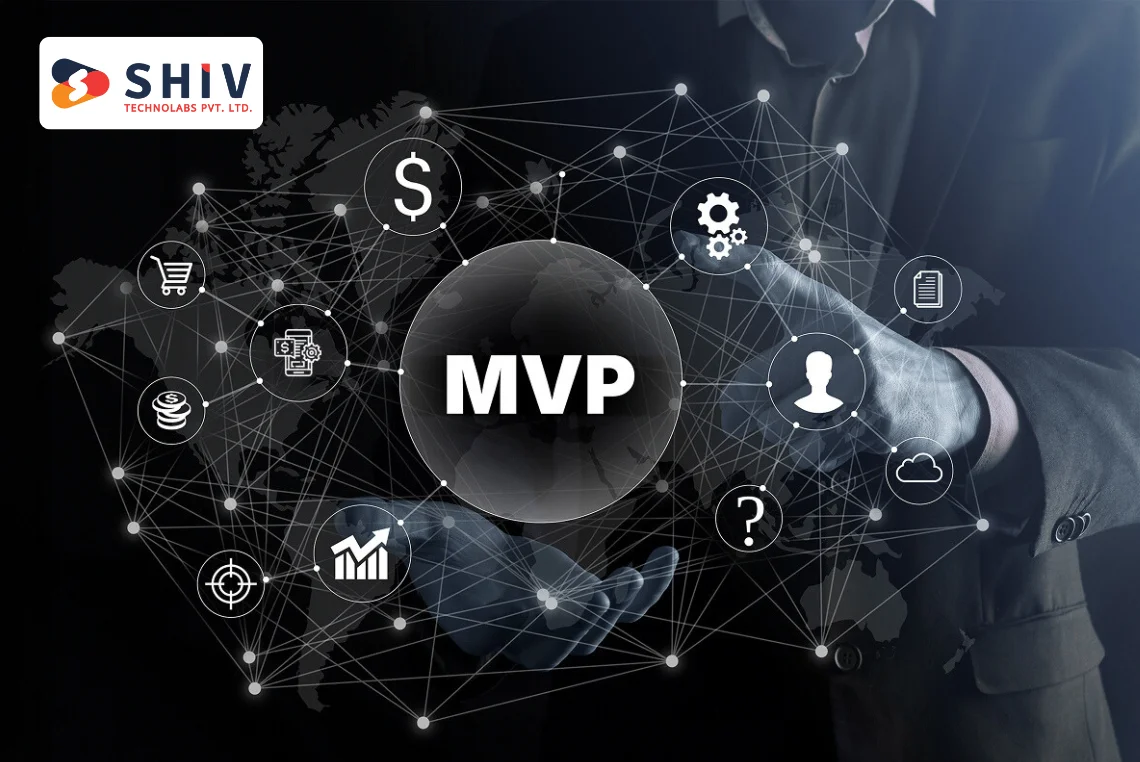Table of Contents
In today’s cut-throat startup landscape, you don’t just launch a Minimum Viable Product (MVP) as part of development; it is more of a strategic decision, getting to know which can actually make or break your new venture. MVP development services have turned out to be the cornerstone of startup businesses, providing founders with a clear vision from concept to market validation. In the case of early-stage startups, MVP serves as their main investing round in raising funds, confirming assumptions, and building investors’ trust.
Whether you develop your MVP internally or by engaging professional teams, it can greatly determine the course of your startup. Startup product development needs highly qualified expertise in the area, who work according to agile methodologies and have deep knowledge of the market specifics. MVP development for startups creates a process, reduces risks, and speeds up time-to-market – three fundamental elements that decide whether your idea will be implemented successfully or you will become one of 90% of failed startups.
Why Do Startups Prefer Experts for MVP Development?
The sooner you learn why startups should work with MVP experts, the earlier you will notice how burdensome it is to launch a new product with constrained resources. The benefits of outsourcing MVP development are more than just cost savings; it is about strategic benefits that in-house teams usually cannot provide, especially for young start-ups without an established development infrastructure.
It is by professional teams that the methodologies and frameworks, which have been tested and improved over many MVP projects, get deployed. The benefits of outsourcing MVP development are clear once you contrast resource allocation, expertise depth, and delivery timelines:
| Criteria | In-house Team | Professional MVP Team |
|---|---|---|
| Cost | Higher long-term expenses | Controlled and planned budget |
| Expertise | Limited to generalist skills | Specialized in MVP development |
| Speed | Slower due to learning curves | Faster delivery with ready teams |
| Quality | Inconsistent without processes | Tested and validated standards |
| Scalability | Requires additional hiring | Flexible resource scaling |
How to Hire a Professional Team for MVP Development?

How to hire a professional team for MVP development is crucial for startup founders. The steps taken during hiring MVP development services should focus on key qualities that distinguish MVP partners from other development companies.
The journey of MVP development for startups begins with the realization of what exactly you want and need to achieve in your business. The right partner should demonstrate technical competence and business acumen. This is quite vital when you look at the cost to build an MVP with professional developers, as clear pricing helps clients to understand your professionalism more easily.
Key criteria for selecting your MVP partner:
- Existing experience with startups: Study their history of successfully established MVP products and services.
- Post-launch support: Maintenance support post launch
- Positive client reviews: Testimonials from startup founders specifically
- Communication protocols: Established frameworks for updates and reporting
Knowing what to expect when working with an MVP partner while selecting will give you a better perspective and set realistic expectations ahead of time so that the alignment is there from day one.
What Are the Key Benefits of Working With MVP Experts?
The added value proposition of partnering with MVP development consulting professionals extends across all strategic, financial, and operational dimensions.
How Professionals Reduce MVP Development Costs
Expectedly, the founders who are used to high-end prices often get surprised by the cost to build an MVP with professional developers. The experienced MVP teams cut down the overall cost by way of efficient planning, reusable component libraries, and smart feature prioritization. Their MVP development expertise makes all the difference since they can avoid very expensive trial-and-error cycles typical of in-house teams.
As a part of that process, the professional teams deploy the know-how acquired from these MVPs to help you find a minimum viable functionality build that will prove or invalidate your core hypothesis. The benefits of outsourcing MVP development include pre-built authentication systems, payment integrations, and UI libraries, which otherwise require weeks of custom development.
How MVP Experts Speed Up Your Startup Launch
The MVP timeline for early-stage startups becomes shorter and more definite with specialized teams. In-house development may take 6-9 months however professional MVP development services create a pattern and deliver fully functional products in 8-16 weeks consistently using pre-built templates, component libraries, as well as standardized architectures.
What to expect when working with an MVP partner is clear if we take as an example the fact that they are able to help start-ups accelerate MVP development for startups by means of agile sprint methodologies which provide ready-to-use features every two weeks.
Why Expert Teams Create Investor-Ready MVPs
The MVP development executed by professionals is the right way to satisfy potential investors in the course of the first sprint. The benefits of outsourcing MVP development include receiving a product that not only has the technical competence but also clearly reflects it in its structure, documentation, and user experience – factors that greatly influence investor confidence in startups product development.
What to Expect When Working With an MVP Partner?
When you know what to expect when working with an MVP partner makes the process of collaboration becomes more certain. The MVP development services delivery model comes in a sequence of defined stages, which balances the flexible nature with predictability.
The typical MVP development process:
- Initial discovery and product vision discussion: Deep dive into your business model and value proposition
- MVP scope and roadmap definition: Feature prioritization and timeline establishment
- UI/UX design and tech stack setup: Interface design and development environment configuration
- Agile sprint-based development: Two-week cycles delivering functional features
- User testing and performance validation: Quality assurance and feedback incorporation
- Launch and feedback integration: Deployment and post-launch optimization
The MVP timeline for early-stage startups becomes predictable through this structured approach. Understanding why startups should work with MVP experts includes recognizing their ability to anticipate challenges and maintain momentum.
7 Proven Reasons Founders Choose Professional Teams for MVP Development

Understanding how to hire a professional team for MVP development starts with recognizing the specific advantages that drive founder decisions.
1. Clear Roadmap and Faster Launch
Professional MVP development services provide structured roadmaps that eliminate uncertainty. The MVP timeline for early-stage startups becomes predictable through experienced estimation. Startup product development accelerates when teams focus on business growth rather than figuring out development processes.
2. Cost Transparency and Predictable Budget
The cost to build an MVP with professional developers is transparent from day one, eliminating budget surprises. MVP development for startups requires careful financial planning, and professional teams provide fixed-price or clearly scoped models that protect startup capital.
3. Access to Skilled MVP Experts
Why startups should work with MVP experts becomes obvious when comparing the specialized knowledge professional teams offer. MVP development requires specific skills in lean methodology, rapid prototyping, and strategic feature prioritization that generalist developers rarely possess.
4. Agile Process and Flexible Scaling
Startups product development demands flexibility as market feedback reshapes product direction. Professional MVP development for startups embraces agile methodologies that allow rapid pivoting without derailing timelines. Understanding what to expect when working with an MVP partner includes anticipating bi-weekly sprints and adaptive planning.
5. Quality Assurance and Testing
Professional MVP development services include rigorous testing protocols that prevent bugs from undermining your launch. The MVP development process incorporates automated testing and performance validation that ensures positive first impressions.
6. Smooth Communication and Reporting
The benefits of outsourcing MVP development include established communication frameworks that keep founders informed. MVP development for startups succeeds when transparency creates alignment between technical execution and business strategy.
7. Post-Launch Support and Updates
Why startups should work with MVP experts extends beyond initial launch to include ongoing optimization. The MVP timeline for early-stage startups doesn’t end at deployment – successful products require continuous refinement. Professional MVP development consulting includes maintenance agreements and iterative improvement cycles.
How to Choose the Right MVP Partner for Your Startup
Selecting the ideal MVP development partner requires evaluating factors beyond technical capability. Startups product development success depends on cultural fit and shared understanding of startup constraints. Knowing how to hire a professional team for MVP development means asking the right questions.
Essential questions to ask potential MVP partners:
- Can you share case studies from startups product development projects similar to ours?
- What is your standard MVP timeline for early-stage startups in our industry?
- How do you handle scope changes during MVP development?
- What should we expect regarding the cost to build an MVP with professional developers?
- What to expect when working with an MVP partner in terms of communication?
- Why do you believe MVP development services from your team deliver better outcomes?
How Professional Teams Help Transform MVP into a Full Product
The journey from MVP to full product requires strategic planning that a professional MVP development consulting team incorporates from day one. MVP development for startups should build foundations that evolve rather than require complete rebuilds.
Startups product development through the MVP phase generates invaluable user data and behavioral insights. Professional MVP development services establish analytics frameworks and feedback mechanisms that capture this learning systematically. The benefits of outsourcing MVP development include receiving a product instrumented for learning from the first user session.
Conclusion
The problem of deciding how to hire a professional team for MVP development is one of the most difficult decisions a founder has to make. The benefits of outsourcing MVP development go much further than just tactical advantage in terms of cost, time, and market validation – it provides its own kind of benefits.
By explaining why startups should work with an MVP expert, one can conclude that the process of MVP development for startups belongs to a completely different type of services that require specific methods and experience. The cost to build an MVP with professional developers can be viewed as a contribution towards speed, quality, and fundability.
Startups product development via MVP development consulting partners regularly delivers better results than internal efforts in key areas: time-to-market, investor readiness, and validated learning per dollar spent. If you want your idea to be transformed into a ready product, connect with Shiv Technolabs’ MVP development team today.
Frequently Asked Questions
How much does it cost to build an MVP with professional developers?
The cost to build an MVP with professional developers normally fluctuates between $15,000 and $75,000, considering its complexity and feature set. MVP development for startups should concentrate on basic features only during the development of an MVP. The benefits of outsourcing MVP development area clear pricing structure and no overheads in terms of full-time salaries and infrastructure costs.
How long does MVP development take for startups?
The default MVP timeline for early-stage startups with professional teams is usually 8-16 weeks from the start to launch. Startups product development timelines can be more or less, however experienced MVP development consulting teams manage to deliver functioning products way faster than internal teams. Understanding what to expect when working with an MVP partner comes in form of bi-weekly sprint deliveries showing constant development.
Why should I outsource MVP development instead of hiring in-house?
The reasons of why startups should work with MVP experts get clarified in the context of speed, cost and quality outcomes. There are several benefits of outsourcing MVP development that include quick access to specialized MVP development skills, faster time-to-market and predictable costs. How to hire a professional team for MVP development is easier than recruiting and managing an in-house team while ensuring enough funds for further growth after the product launch.
What are the key stages in MVP product development?
There are distinct structured stages that professional MVP development services go through that includes discovery and validation, scope definition, UI/UX design, iterative development in agile sprints, comprehensive testing, and finally launch with monitoring. Each stage of MVP development for startups has its own specified deliverables that guarantee the project’s alignment with business objectives.
How do MVP development services help startups attract investors?
It is MVP development consulting teams that create the products of this level showing already that they possess technical knowledge, market validation and possibility of scalability. MVP development services include professional documentation, clean architecture, and user metrics that address investor concerns.






















